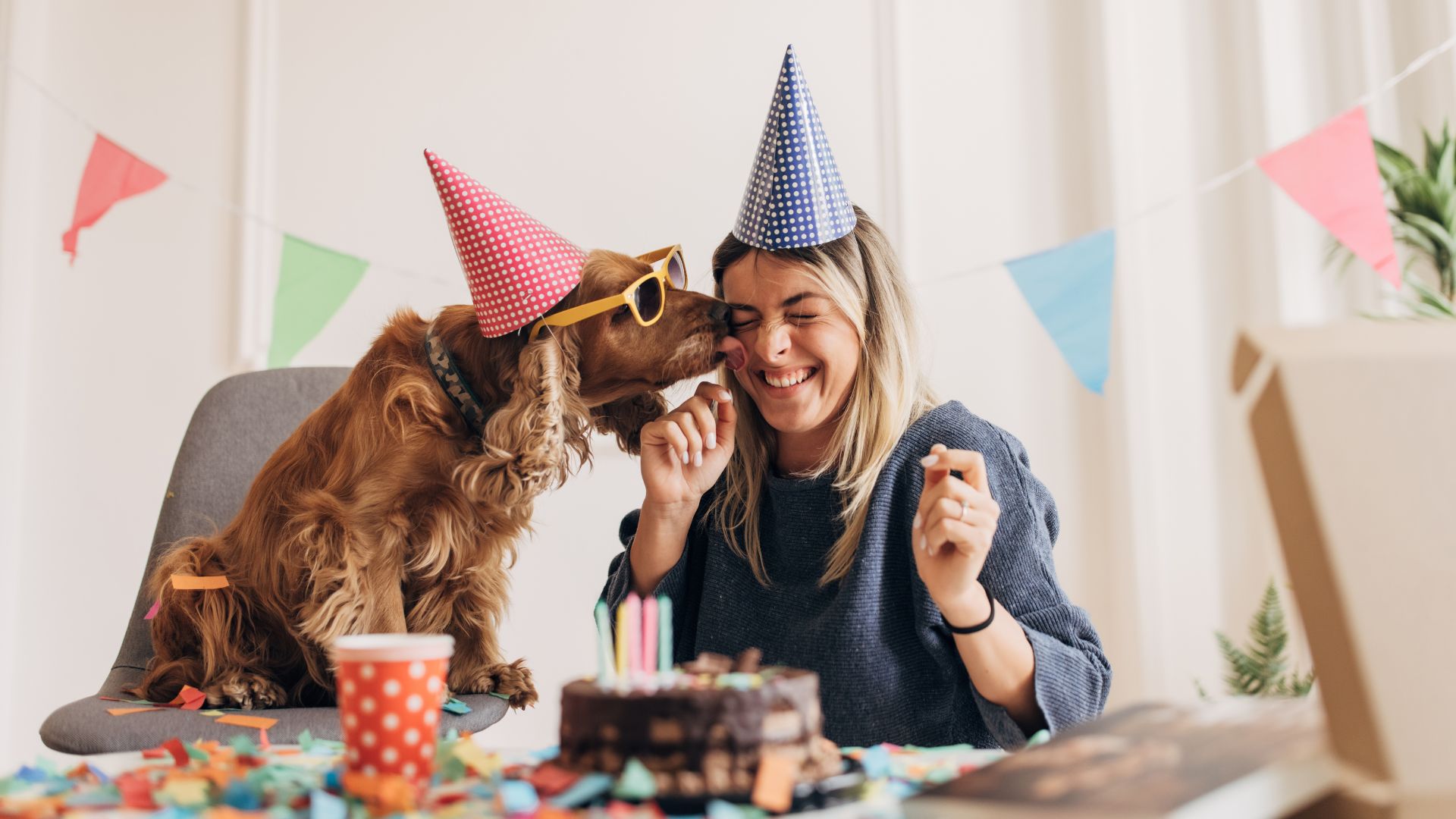The best puppy sleep aids to help your dog drift off
Getting a pup to sleep is no easy task, but the best puppy aids are here to the rescue.
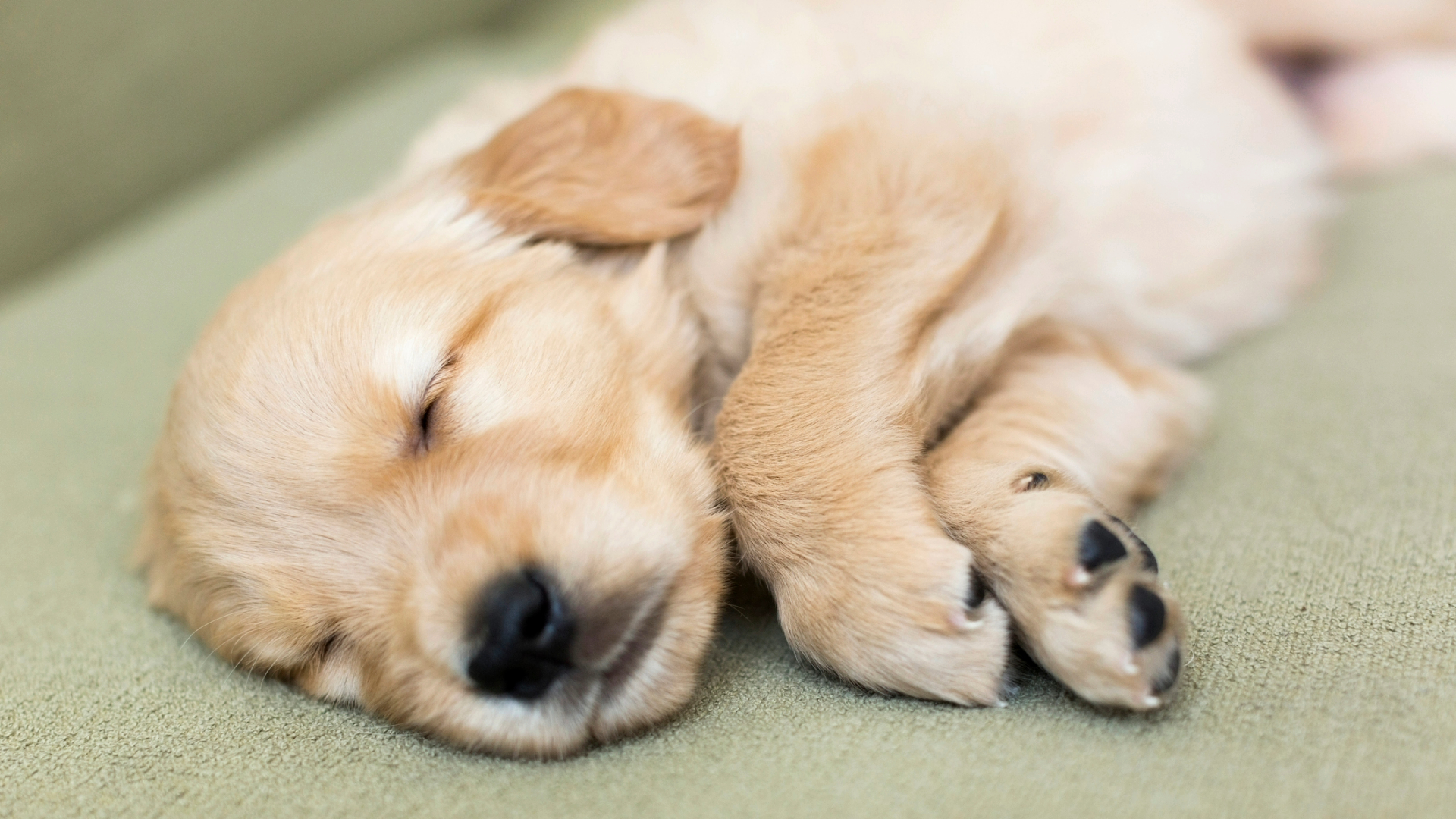
Searching for the best puppy sleep aids is important if your young dog is having trouble drifting off. Without sufficient sleep, growth and development can be hampered so fostering healthy sleep habits early in a puppy’s life is crucial and, as you’ll see, help is at hand.
There are many products on the market from cuddly teddy bears to comfortable crate mats so you can be assured that your pup isn’t alone. Some of these items can be real game-changers too, not only ensuring your puppy gets sufficient sleep but making life easier for you as well.
In this guide, we explore and suggest a variety of products which will help you when you’re totally stuck and desperately wondering how to get a puppy to sleep through the night. If you use them with the best dog crates, you’ll be able to create a safe, secure and relaxing environment in which sleep is more of a given.
To help, we’ve sought the advice of expert vet Dr Hannah Godfrey who has also answered a series of key questions. So let’s take a look at the best puppy sleep aids you can buy today and make nighttimes more pleasurable for both you and your dog.
PetsRadar's pick of the best puppy sleep aids
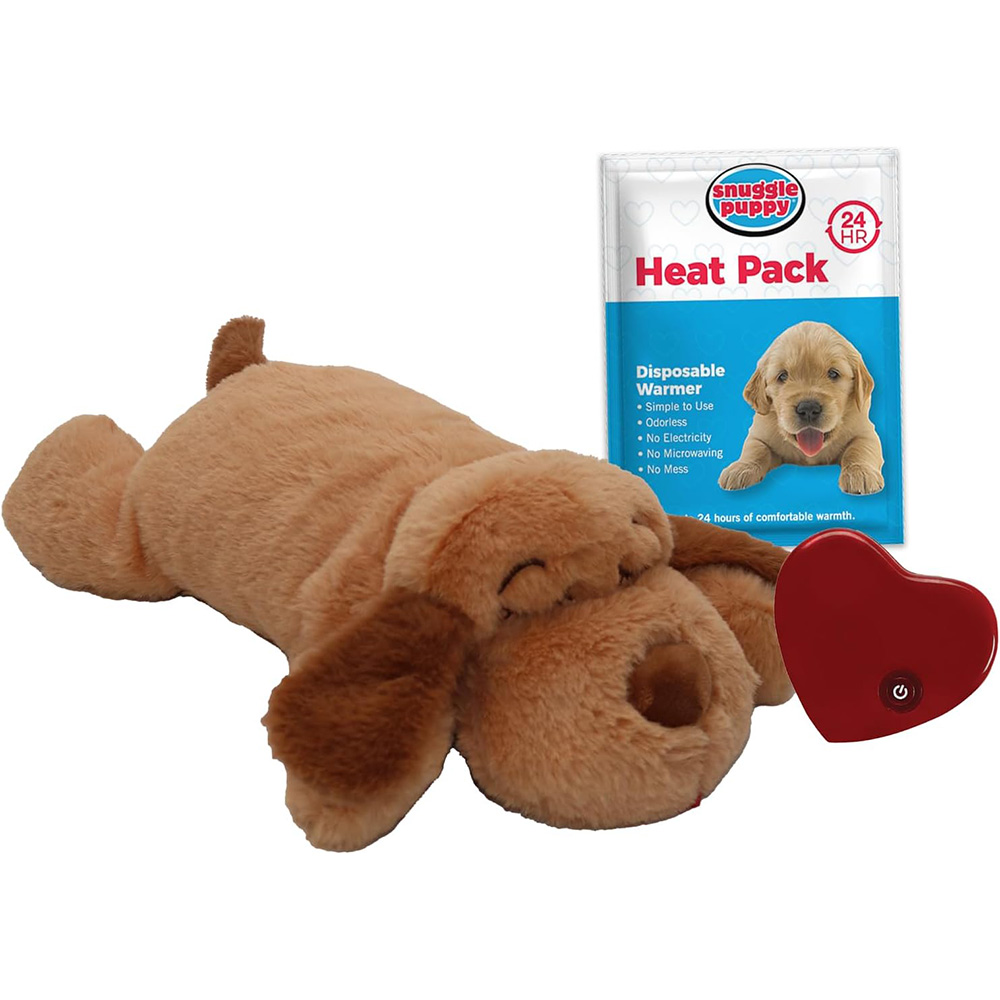
Best puppy sleep aid for reducing anxiety
This toy will offer some much-needed comfort to puppies showing signs of separation anxiety. Recreating the physical warmth and intimacy they would have with their mother, the Snuggle Puppy works to reduce the feelings of stress and loneliness that often occur during those first few months of being in a new environment.
Your fur baby will love the pulsing heartbeat, which helps calm nerves and provides those feelings of safety and security. A single 24-hour disposable heat pack provides an extra source of comfort and once used, you can replace it with any other store-bought version. Batteries are also included and last up to two weeks with 24/7 use.
Simply press the power button and it will stay on for a full eight hours. For continuous use, hold the button for five seconds. This is also a great toy to use during fireworks or thunderstorms, when dogs can often become frightened or unsettled.
Reasons to buy: It eases crying and loneliness with its real-feel pulsing heartbeat. There’s a disposable heat pack too.
Reasons to avoid: It has a short battery life. If you’re using it frequently then you’ll need to change the batteries every two to four weeks.
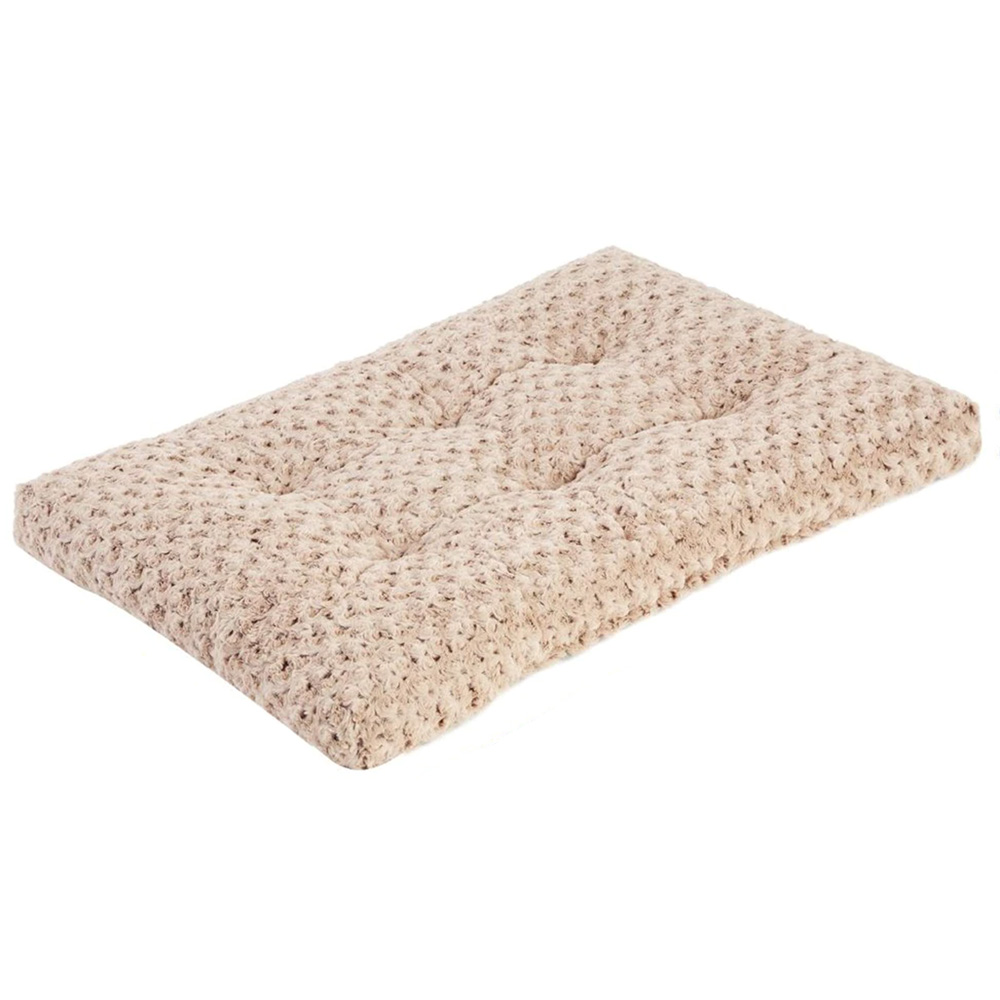
Best budget puppy sleep aid
If your puppy is sleeping in a crate, then this ultra-plush mocha swirl mat is a steal, especially at this price. As well as having you your puppy in the land of nod before you know it, the non-skid bottom will keep them secure. The poly-fiber cushion offers the ultimate in comfort and the polyester material makes this a great choice all year round, keeping your dog cool in the summer and warm in the winter.
The mat comes in a variety of sizes, so it’s suitable for small or large pups and will last into adulthood. It’s also durable enough to be machine-washed which makes keeping it smelling fresh easy. It can also double-up as a standalone bed and easily fits in the car, offering your pup the best that luxury travel has to offer. If you have a heavier dog, however, you may find that it flattens quickly but that’s a small issue for a mat in the budget price range.
Reasons to buy: This warm and snuggly mat will make your little fur baby feel like they’re curled up next to their mum, helping both them and you to sleep through the night.
Reasons to avoid: Although coming in a variety of sizes, you may find it flattens quickly with larger dogs.
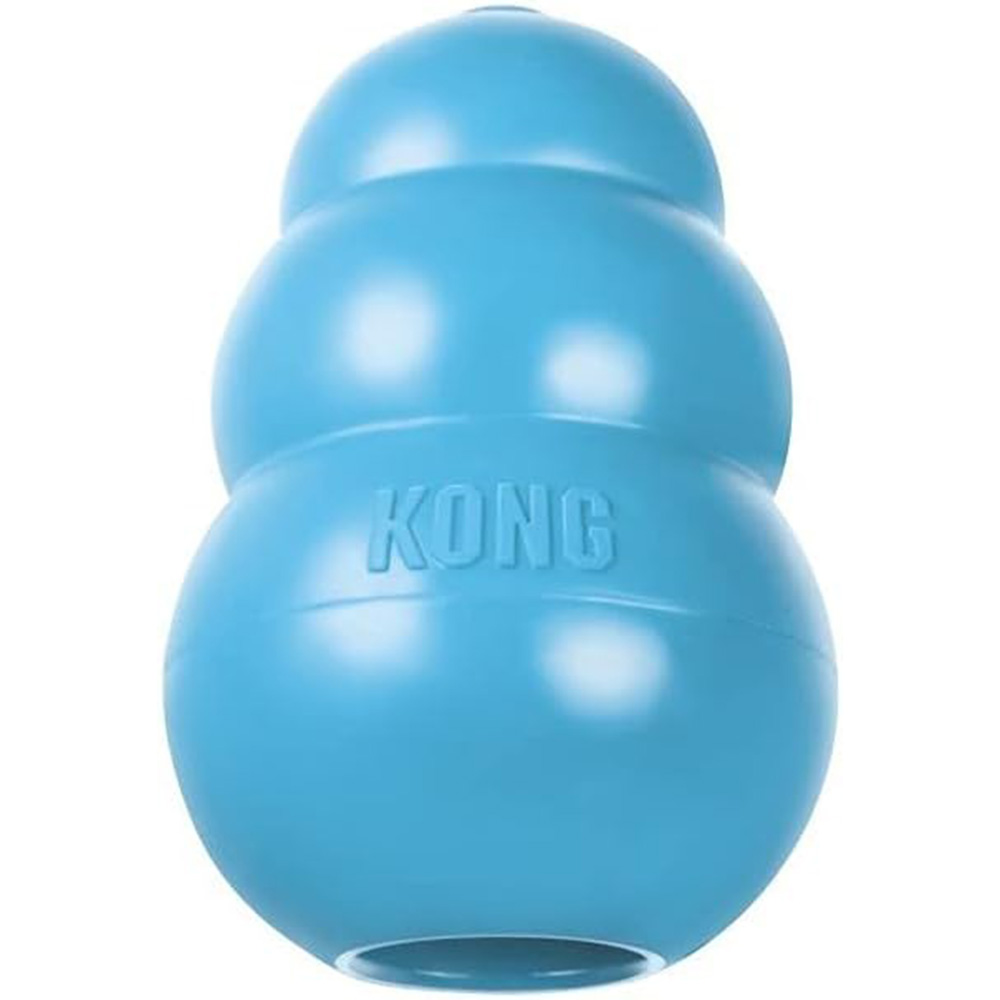
Best puppy sleep aid for teething pups
If your puppy’s inability to settle at night is due to teething, try this chew toy. Made from an all-natural rubber formula and available in three sizes and two colours, it works to soothe pain, clean teeth and teach proper chewing behaviour. It’s also great for helping ease separation anxiety and boredom.
We love that while it’s customized for your puppy’s baby teeth and gums, the unique design makes the toy a great vessel for stuffing with peanut butter, puppy kibble or dog food paste, which provides your pup with plenty of mental and physical stimulation. It also offers some seriously unpredictable bounce when thrown, making for a super fun game of fetch.
Offering longevity, robustness and fun, this toy has everything you need to keep your puppy engaged during the day and to help them settle at night. Plus, it comes at a bargain price which makes it pretty close to perfect in our book.
Reasons to buy: Offering longevity, robustness and fun, this toy also comes with the thumbs up from veterinarians and trainers.
Reasons to avoid: Some pet parents say that, depending on what you stuff the toy with, it can stain easily and be difficult to clean.
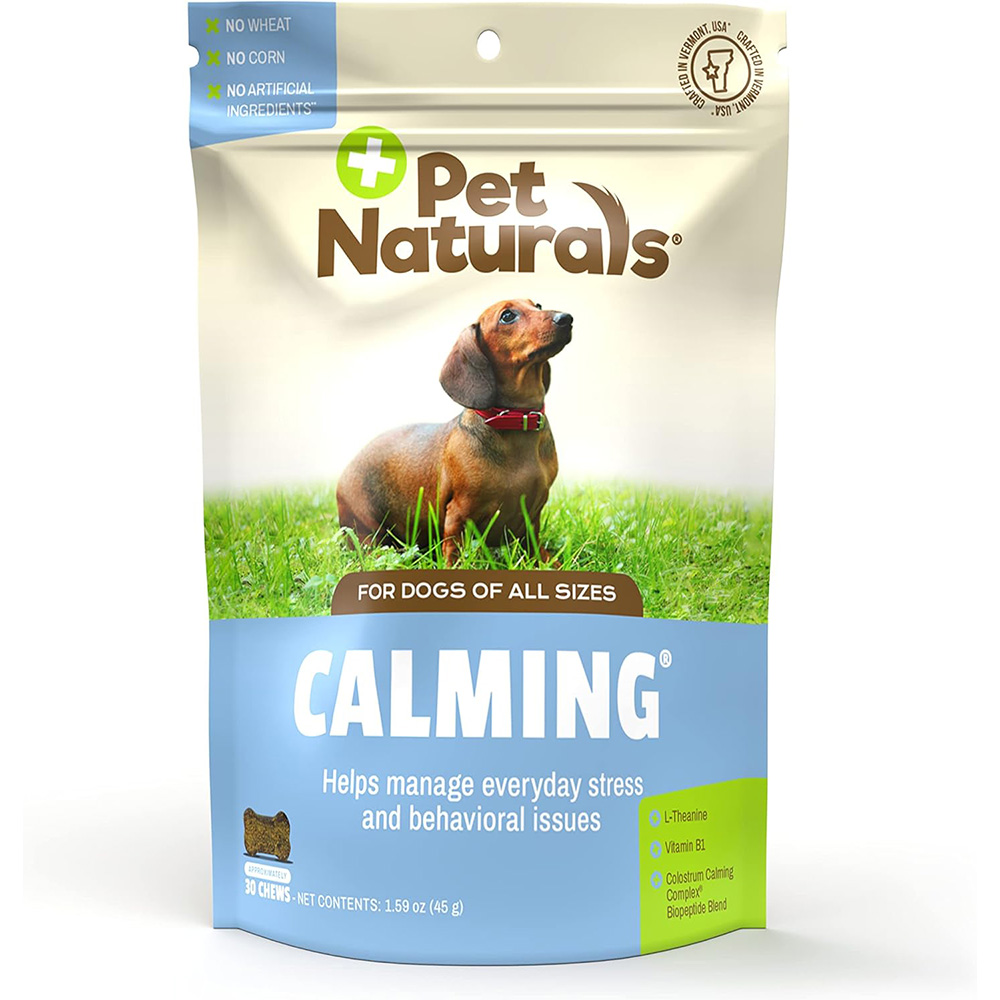
Best calming treat puppy sleep aid
You’ll find dog treats can be a useful tool when sleep training because there’s nothing your pup will love more than being rewarded for good behavior. Small, tasty treats work well as an incentive when training your pup to sleep in a crate or other location of your choosing but you can also buy those that have a calming effect.
Pet Naturals’ treats contain Vitamin B1, L-Theanine and a Colostrum Calming Complex biopeptide blend and the overall effect of these natural ingredients is a chew that promotes calming and manages every day stress without making your puppy drowsy. It becomes effective within 30 minutes and should be used sparingly – half a chew is enough. But since the product has been formulated with the assistance of veterinarians and approved by the National Animal Supplement Council, you can be assured it is safe. Just stick to the packet’s guidelines.
Reasons to buy: If stress and anxiety is keeping your puppy awake, these chews should help to quickly calm the situation.
Reasons to avoid: Don’t buy them thinking that they’ll be the magic answer: you still need to address any underlying sleep issues.

Best puppy sleep aid for generating heat
Although there are similarities between this toy and the Snuggle Pup, the big advantage here is that you don’t need to keep buying heat packs. You simply pop the pack in the microwave, warm it up and insert it in the bottom hook and loop pouch before handing the toy to your puppy. This will give it a very warm, snuggly feel and a quick touch yourself will work out whether it’s become too hot or not.
The toy also comes with a removable heartbeat device that requires a couple of batteries and, when turned on, it will continue to beat for four hours although you can set it to go for double that time. The overall effect is a very mummy-like aid that should settle down most pups, providing a great deal of comfort. We also like that the toy (minus the heat pack and the heartbeat device) can be popped in the washing machine although we would suspect the Snuggle Pup would last longer in the long run.
Reasons to buy: The microwavable heat pack makes this a very fuss-free puppy sleep aid – no need to keep buying packs.
Reasons to avoid: Some puppy owners have reported their pets ruining the toy through chewing.
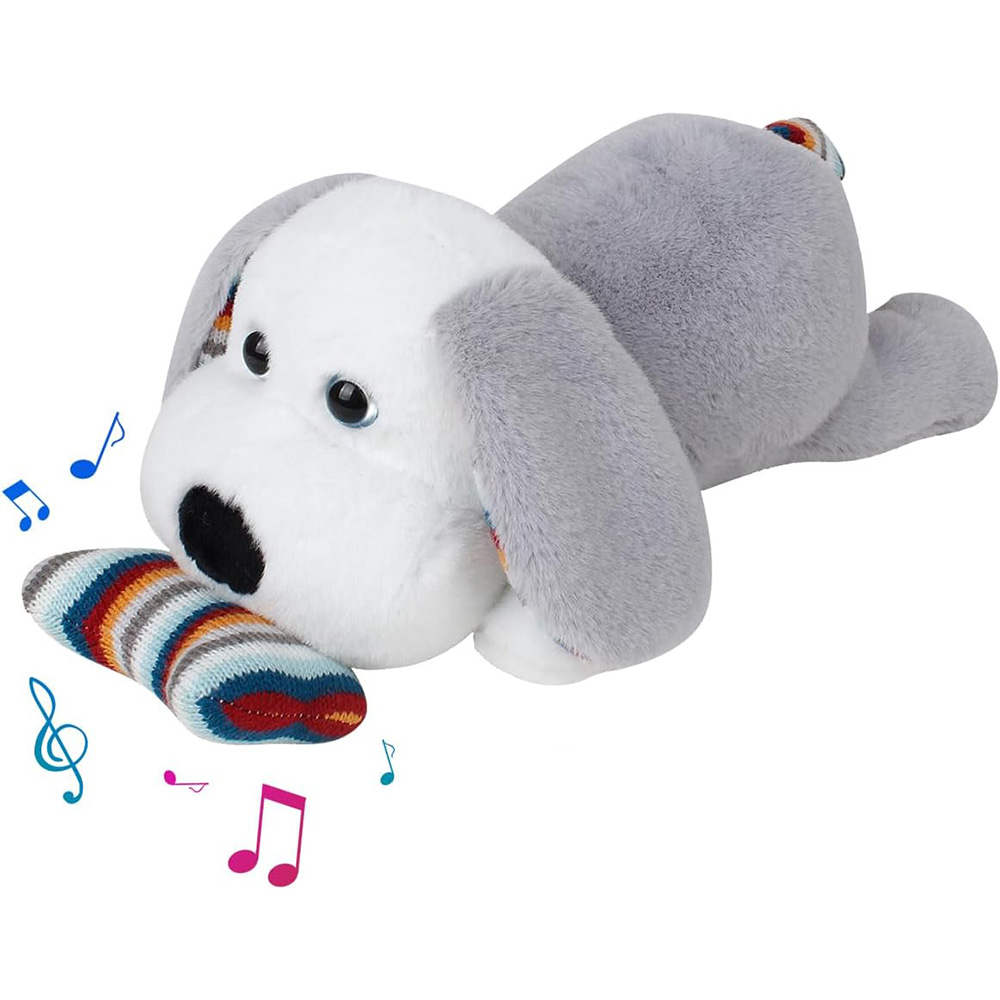
Best puppy sleep aid for soothing noise
On the face of it, this is just a plush toy. It doesn’t contain a heat pack and it doesn’t have a heartbeat. But it does play music and because it has a built in gear, it doesn’t require any batteries either. That’s a feature which is particularly kind on your wallet (especially given it’s a relatively inexpensive aid) but it also means that, should your puppy manage to chomp away, there is no danger of them coming into contact with a dangerous power supply.
The dog itself is very cute and the idea is that your puppy will find its soft feel reassuring. The lullabies it plays aren’t too loud either so it’s not going to prove distracting or annoying. The music box can be felt through the toy which gives it a bit of a hard feel in places but so long as your puppy isn’t excessively chewing when you use it, you should find he or she snuggles in and finds comfort.
Reasons to buy: It’s a soft toy that plays soothing sounds – they could even send you to sleep!
Reasons to avoid: You will need to keep pulling on the gear in order to get it to play the music.
How we chose the best puppy sleep aids
There is a wide variety of sleep aids available but our tests focused on some common themes. The first focused on safety – could a dog potentially pull the aid apart? The second looked at effectiveness: one of the things that helps a puppy sleep in their first few weeks of life is the warmth and intimacy that their mother provides so recreating that as best you can is key. Was the product able to do this? We also looked to see if an aid was able to help ease separation anxiety in dogs and make your puppy feel less alone by proving to be suitably distracting.
How long do puppies need to sleep for?
Puppies need lots of sleep and, as expert vet Dr Hannah Godfrey points out, you’ll probably notice that they spend lots of time asleep before waking up full of energy and then having another nap!
“That’s completely normal puppy behavior,” she adds. “In terms of their needs, young puppies (less than three-months-old) will need around 18–20 hours of sleep per day. This gradually reduces as they grow but even adult dogs may enjoy a regular nap on top of their nighttime sleep.”
What is the best thing for puppies to sleep in?
According to Dr Godfrey puppies should have a dedicated sleep space that is theirs, with a comfy bed and water available, and perhaps a toy or two for comfort. She also suggests puppyhood is the ideal time to learn how to crate train a dog.
“It might seem harsh, but crate training your puppy will actually give them a sanctuary to retreat to throughout their life, where they know they will be safe and you will know not to disturb them. Therefore, having your pup sleep in one of the best dog crates from day one will help them to get used to it and establish their routine.”
Is there an ideal sleep routine for puppies?
Don’t be too strict with your dog. Let them go with the flow and work out what is best for themselves.
“It’s a good idea to let your puppy dictate their daytime awake times and nap times – they’ll do whatever they need,” Dr Godfrey says.
But there are some things you can do if you want to introduce some structure. Avoid feeding the best puppy food too late in the evening, for instance, so they have time to digest their food and keep a set routine or cues around bedtime. Take them to the bathroom before bed too.
“It might be a good idea to make the most of their awake time in the evening by doing something active,” Dr Godfrey continues. “That way they’ll be worn out and ready to have a longer sleep overnight.”
How do puppy sleep aids help?
Puppies snuggle up to toys that are cuddly and soft because it creates a feeling of warmth and intimacy. Aids which come with battery operated heartbeats and warming pads also mimic the feeling a puppy has when curled up next to their mother. If you also make use of a cozy, comfy bed that is placed in a quiet location of the house, away from noisy household appliances, you will find sleeping aids work more effectively. Blackout blinds in the area where a puppy sleeps are also useful, especially in the lighter summer months.
“There are a range of sleep aids available for puppies, from cuddly toys to sound machines and heated beds and blankets,” affirms Dr Godfrey. “You can even use calming sprays and diffusers to help them settle as long as they’re pet-friendly. Never underestimate the power of some items you already have in your home either – their favorite stuffed toy, or a T-shirt that smells of you will help to give them the comfort and reassurance they need.”
Which sleeping aids should I avoid?
There are some potential problems to watch out for. “While the sound of a heartbeat or the warmth of a comforter might help puppies feel safe, there are some dangers associated with electronic devices and heated objects,” says Dr Godfrey. “For instance, a battery-powered sound machine inside a stuffed toy could cause harm when chewed, and a burst hot water bottle could cause serious burns.”
What keeps puppies awake?
Puppies might wake lots at night initially before they settle into your home and a routine.
“They may miss contact with their mother and littermates, or they might feel lonely, scared, or bored,” Dr Godfrey explains. “Perseverance and reassurance will help with this – make sure you stick to their routine. However, don’t forget that pups, as well as adult dogs, can wake up because they are hungry, thirsty, or need to go out to pee or poop. Pups can’t hold their urine and feces as long as adult dogs, so they’ll need a few more toilet breaks.”
Read next: Why shouldn't you sleep with your dog?

Dr Hannah Godfrey studied Veterinary Medicine at the Royal Veterinary College London. After graduating in 2011, Dr Godfrey went on to become a veterinary surgeon, conducting surgery consultations on a range of animals at a small independent practice in Cardiff, South Wales, UK. Dr Godfrey has a strong interest in soft tissue surgery. When she’s not helping animals back on their feet, Dr Godfrey writes a number of veterinary and animal-focussed articles.
PetsRadar Newsletter
Get the best advice, tips and top tech for your beloved Pets

David Crookes has been a journalist for almost 30 years and he has written for a host of magazines, newspapers, websites and books including the World of Animals Annual, BBC Earth, Live Science, The Independent and Tom’s Guide.
Born in England, he lives with two cats but he’s also keenly interested in the differences between the huge number of dog breeds – in fact, you can read many of his breed guides that he’s written in collaboration with vets here on PetsRadar.
With a lifelong passion for technology, too, he’s always on the lookout for useful devices that will allow people to keep their pets happier and healthier, and provide them more time to spend together.
David has a degree from Durham University, as well as postgraduate diploma in journalism from the University of Central Lancashire.
- Dr Rebecca MacMillanVet
- Kathryn WilliamsFreelance writer
